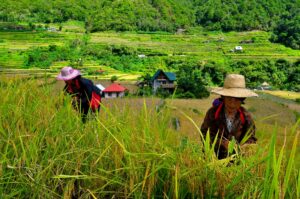President of The Gambia received a delegation led by the Korean Ambassador to The Gambia, at the State House in Banjul. The Korean Team handed over seeds of a rice variety to increase rice production in the country.
The rice variety, which helped Korea revolutionize its rice production and food security concerns in the 1970s, is adaptable to different soil conditions,
It has been successfully tested in Guinea and Senegal. If successful in The Gambia, the rice variety could double the country’s current rice production capacity.
Read the story @African Business
More on improving rice production in Africa:
Researchers exchange knowledge on rice diseases in Sub-Saharan Africa
Researchers including pathologists in Sub-Saharan African agri-food systems state the pressing importance of boosting the agri-food system in the region to address its growing needs. This message was conveyed during a workshop on rice pathology held in the city of Bujumbura, Burundi from May 9 to 13, 2022.
Rice Technology Transfer Systems: A driving force for the development of rice production across Asia and Africa
The goal of the workshop, which ran from 2002-2018, was to share relevant information, extend applicable components of Korean agriculture and technology that participants can apply in their home countries, and build the capacity of the participants for enhancing the agro-industry technology transfer system. Among other things, it also aimed to improve technology promotion and delivery of knowledge and skills to participants through various interactive and participatory learning methods.
New improved rice varieties for Burundi today, food security for Africa tomorrow
There is a growing need to boost domestic rice production in Africa as the demand for rice in the continent increases. Many African countries rely on imported rice to meet their growing consumption needs, according to the Food and Agriculture of the United Nations. The agency describes the situation as posing “serious food security challenges since rice is now recognized as a priority and strategic food security crop for the region.” This makes efforts to further increase production through better performing varieties that are climate-resilient, pest tolerant, and disease resistant more urgent.






